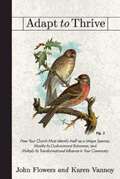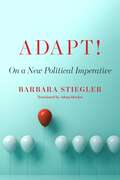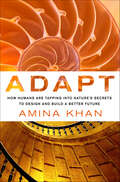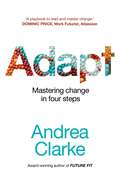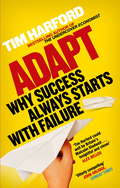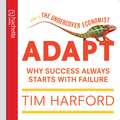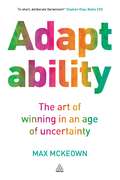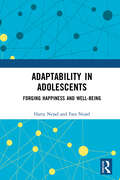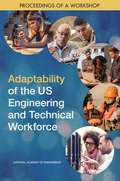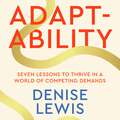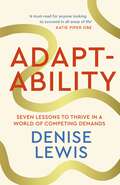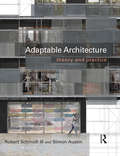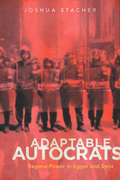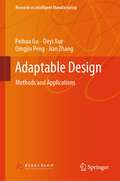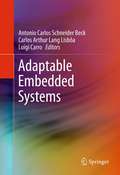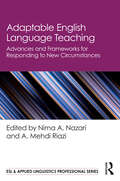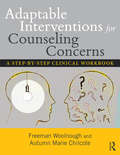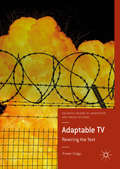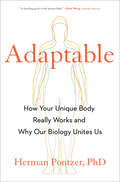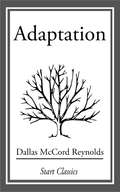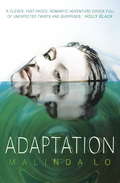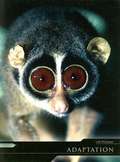- Table View
- List View
Adapt the Master Brand to Silo Markets: Developing a Master Brand Strategy
by David AakerStandardizing the brand and supporting marketing programs across all silos of an organization facilitates consistency in look, feel, and message. In addition, the chances of creating synergistic marketing programs will be enhanced, and the organization will be more likely to rally around the brand promise. However, there are situations in which a standardized brand is not optimal or even feasible because it cannot deliver a winning position in a silo market. In that case, there needs to be a process to adapt a master brand so that it has traction in each silo market while maintaining consistency to its core values.
Adapt to Thrive: How Your Church Must Identify Itself As A Unique Species, Modify Its Dysfunctional Behaviors, And Multiply Its Transformational Influence In Your Community
by John Flowers Karen VannoyThrough stories from real churches and real people, Adapt to Thrive offers an engaging metaphor for the adaptive development of God's creation. This call to action reveals how your church must identify itself as a unique species, modify its dysfunctional behaviors, and multiply its transformational influence in the community.
Adapt!: On a New Political Imperative
by Barbara StieglerWinner, French Voices AwardThis book, a crossover hit in France, offers a fresh genealogy of our neoliberal moment.“We must adapt!” These words can be heard almost everywhere and in every aspect of our lives. Where does this widespread sense that we have fallen behind come from? How can we explain this progressive colonization of the economic, social, and political fields by this biological vocabulary of evolution? Offering a lucid account of sophisticated material, Barbara Stiegler uncovers the prehistories of today’s ubiquitous rhetoric in Darwinism and American liberalism, while, at the same time, recovering powerful resistances to the rhetoric of adaptation across the twentieth century.Walter Lippmann, an American theorist of this new liberalism, believed democracy was not adapted to the needs of globalization. Only a government of experts could force society to evolve, he argued. Lippmann thus found himself confronted with John Dewey, the great figure of American Pragmatism. Both Lippmann and Dewey labored under the impression that the world had changed and society needed to adapt. However, Lippmann did not trust society to adapt on its own and insisted on the need for experts who would force the necessary adaptation. Dewey, by contrast, believed the necessary adaptation could only come "from below" and should proceed in a democratic fashion. Focusing on readings of Michel Foucault, Walter Lippmann, and John Dewey, Adapt! paves the way for renewed insights into neoliberalism’s history, essence, characteristic forces, and impacts, as well as biopolitical theory. Stiegler presents an intriguing new genealogy for the development of neoliberalism, examining whether humans are by nature lagging and require biopolitical and disciplinary management to enforce adaptation. Stiegler also reorients Foucault’s genealogy of neoliberalism by emphasizing the Darwinian rhetoric of adaptation, as it arose in the Lippmann–Dewey Debate, and deftly handles the question of human nature in a way that re-enlivens this traditional concept. As the industrialization of our ways of life never stops destroying the environment and the health of organisms (climate disruption, the destruction of biodiversity, the growth of chronic diseases, the return of large pandemics), how can we think of a democratic government of life and the living? This is the question that Stiegler’s work helps us to confront.
Adapt: How Humans Are Tapping into Nature's Secrets to Design and Build a Better Future
by Amina KhanAmina Khan believes that nature does it best. In Adapt, she presents fascinating examples of how nature effortlessly solves the problems that humans attempt to solve with decades worth of the latest and greatest technologies, time, and money. Humans are animals too, and animals are incredibly good at doing more with less. If a fly’s eye can see without hundreds of fancy lenses, and termite mounds can stay cool in the desert without air conditioning, it stands to reason that nature can teach us a thing or two about sustainable technology and innovation. In Khan’s accessible voice, these complex concepts are made simple. There is so much we humans can learn from nature’s billions of years of productive and efficient evolutionary experience. This field is growing rapidly and everyone from architects to biologists to nano-technicians to engineers are paying attention. Results from the simplest tasks, creating Velcro to mimic the sticking power of a burr, to the more complex like maximizing wind power by arranging farms to imitate schools of fish can make a difference and inspire future technological breakthroughs.Adapt shares the weird and wonderful ways that nature has been working smarter and not harder, and how we can too to make billion dollar cross-industrial advances in the very near future.
Adapt: Mastering change in four steps
by Andrea ClarkeTransform your life and your career with the four steps to adapt effectively to change: Engage, Accept, Activate, Release. &‘A powerful playbook to lead change.&’ Dominic Price, Atlassian After the global pause in 2020, we returned to a world that feels faster, looser, and less structured – our professional boundaries have been erased, social and cultural norms are shifting rapidly, and at the same time, we're facing profound developments in artificial intelligence. We're facing more change more often, yet we're applying a mindset that is outdated and no longer fit-for-purpose.Adapt offers a fresh perspective. Andrea Clarke, the award-winning author of Future Fit, argues that rather than retreat from change or resist it, we must engage with it continuously and learn how to anticipate and shape it. She will teach you practical tools, including how to scan for signals of change to minimise disruption, apply the good advice test to make better decisions, use the 80/20 rule to explore unseen opportunities, and protect your health with the energy curve. Whether you&’re striving to be a better leader, or seeking more control over your life, Adapt will equip you with a new way to master change in an unpredictable world. This book reframes change as a powerful tool for growth, opportunity and meaningful progress.
Adapt: Why Success Always Starts with Failure
by Tim HarfordEverything we know about solving the world's problems is wrong. Out: Plans, experts and above all, leaders. In: Adapting - improvise rather than plan; fail, learn, and try againIn this groundbreaking new book, Tim Harford shows how the world's most complex and important problems - including terrorism, climate change, poverty, innovation, and the financial crisis - can only be solved from the bottom up by rapid experimenting and adapting.From a spaceport in the Mojave Desert to the street battles of Iraq, from a blazing offshore drilling rig to everyday decisions in our business and personal lives, this is a handbook for surviving - and prospering - in our complex and ever-shifting world.
Adapt: Why Success Always Starts with Failure
by Tim HarfordEverything we know about solving the world's problems is wrong. Out: Plans, experts and above all, leaders. In: Adapting - improvise rather than plan; fail, learn, and try againIn this groundbreaking new book, Tim Harford shows how the world's most complex and important problems - including terrorism, climate change, poverty, innovation, and the financial crisis - can only be solved from the bottom up by rapid experimenting and adapting.From a spaceport in the Mojave Desert to the street battles of Iraq, from a blazing offshore drilling rig to everyday decisions in our business and personal lives, this is a handbook for surviving - and prospering - in our complex and ever-shifting world.
Adaptability
by Max MckeownAll success is successful adaptation. All failure is a failure to adapt. Adaptability is about the powerful difference between adapting to cope and adapting to win. Fascinating real-world examples from business, government, and sport, military and wider society bring the rules of adaptability to life. From the world's most innovation corporations to street-level creativity emerging from the slums. From McDonalds to Sony, from post-war Iraq to the revolutions of the Arab Spring, from the bustling markets of Hong Kong to the rubber marked circuit of the Monte Carlo Rally. With insightful rules, Max Mckeown shows you how to increase the adaptability of your organization to create winning positions. Human history is a story of competition to adapt between groups and individuals. It has never been more important to understand how to think better and adapt.
Adaptability in Adolescents: Forging Happiness and Well-Being
by Harry Nejad Fara NejadThis book discusses a newly developed concept of adaptability capacity and development as an extension of Charles Darwin’s work on adaptability. It looks at how the human mind uses adaptability resources to deal with life-changing, challenging, and varying circumstances and conditions. The volume presents an integrative process model that assesses the roles of socio-demographic and ability covariates, personality, and other dispositional presage factors in predicting psychological well-being outcomes, such as life satisfaction, happiness, and self-esteem. While exploring the concept of adaptability capacity, the volume focuses on making children and adolescents mentally, emotionally, and behaviorally adaptable. It discusses general and domain-specific constructs relevant to phenomena such as self-regulation, resilience, buoyancy, and coping mechanisms. The book focuses on the development and utilization of treatments to assist individuals in becoming positively adaptable and achieve a higher degree of positive well-being and self-actualization. An important contribution, this book will be of interest to students, researchers and teachers of psychology, educational psychology, and social work. It will also be helpful for academicians, mental health professionals, social workers, psychiatrists, counsellors, and those working in related areas.
Adaptability of the US Engineering and Technical Workforce: Proceedings Of A Workshop
by Engineering Medicine National Academies of SciencesIn 2015 the National Academy of Engineering (NAE) released the report Making Value for America: Embracing the Future of Manufacturing, Technology, and Work. That study observed that technological developments, reengineered operations, and economic forces are transforming the way products and services are conceived, designed, made, distributed, and supported, a transformation that is having profound effects on the world of work. Jobs consisting of repetitive tasks are being disrupted by automation or offshored to lower-cost producers. Workers are being asked to upgrade their skills to become more productive and adaptable. So far these changes have been most notable in manufacturing and high-technology services, but they are poised to also transform enterprises in energy, health care, education, and other sectors. To explore the effects of these changes on the workforce and on individual workers, the NAE held a workshop November 2–3, 2017, entitled “Preparing the Engineering and Technical Workforce for Adaptability and Resilience to Change.” The first goal of the workshop was to increase stakeholders’ understanding of both the importance of workforce adaptability and the definition and characteristics of adaptability. The second goal was to provide an opportunity to share best practices for fostering adaptability and to identify needs for future study and development. This publication summarizes the presentations and discussions from the workshop.
Adaptability: Seven Lessons to Thrive in a World of Competing Demands
by Denise LewisHarness the power of adaptability to embrace change, overcome obstacles and achieve success.Women are facing more pressure and stress than ever before. Between work, childcare, caregiving responsibilities, maintaining relationships and looking after finances, many are struggling to manage the demands placed on them, with a significant number feeling overwhelmed and unable to cope at times. These challenges are something that Denise Lewis understands well; as an athlete, broadcaster, woman, and mother, her life, like that of many women, is one of constant adaptation. Now, Denise is determined to help women harness the power of adaptability. She aims to teach you how to become your own life coach and navigate the many roles we take on throughout life. In Adaptability, she will guide you through seven key lessons learned from her experiences both on and off the track, including maintaining your identity, building resilience, seeking support, trusting your instincts, and more. By applying these principles, women from all backgrounds can unlock their full potential, develop the tools to overcome challenges, and embrace their multifaceted identities both at work and beyond.While we may not be able to have it all, we can come close by consciously cultivating the skills needed to thrive in every area of our lives.
Adaptability: Seven Lessons to Thrive in a World of Competing Demands
by Denise LewisHarness the power of adaptability to embrace change, overcome obstacles and achieve success.Women are facing more pressure and stress than ever before. Between work, childcare, caregiving responsibilities, maintaining relationships and looking after finances, many are struggling to manage the demands placed on them, with a significant number feeling overwhelmed and unable to cope at times. These challenges are something that Denise Lewis understands well; as an athlete, broadcaster, woman, and mother, her life, like that of many women, is one of constant adaptation. Now, Denise is determined to help women harness the power of adaptability. She aims to teach you how to become your own life coach and navigate the many roles we take on throughout life. In Adaptability, she will guide you through seven key lessons learned from her experiences both on and off the track, including maintaining your identity, building resilience, seeking support, trusting your instincts, and more. By applying these principles, women from all backgrounds can unlock their full potential, develop the tools to overcome challenges, and embrace their multifaceted identities both at work and beyond.While we may not be able to have it all, we can come close by consciously cultivating the skills needed to thrive in every area of our lives.
Adaptability: Seven Lessons to Thrive in a World of Competing Demands
by Denise LewisHarness the power of adaptability to embrace change, overcome obstacles and achieve success.Women are facing more pressure and stress than ever before. Between work, childcare, caregiving responsibilities, maintaining relationships and looking after finances, many are struggling to manage the demands placed on them, with a significant number feeling overwhelmed and unable to cope at times. These challenges are something that Denise Lewis understands well; as an athlete, broadcaster, woman, and mother, her life, like that of many women, is one of constant adaptation. Now, Denise is determined to help women harness the power of adaptability. She aims to teach you how to become your own life coach and navigate the many roles we take on throughout life. In Adaptability, she will guide you through seven key lessons learned from her experiences both on and off the track, including maintaining your identity, building resilience, seeking support, trusting your instincts, and more. By applying these principles, women from all backgrounds can unlock their full potential, develop the tools to overcome challenges, and embrace their multifaceted identities both at work and beyond.While we may not be able to have it all, we can come close by consciously cultivating the skills needed to thrive in every area of our lives.
Adaptable Architecture: Theory and practice
by Robert Schmidt III Simon AustinAdaptable Architecture provides thought-provoking and inquisitive insights into how we can prolong the useful life of buildings by designing them to be more adaptable, and hence create a more sustainable built environment. The book provides a theoretical foundation counterpointed by the experiences and ideas of those involved in the design and use of buildings. It explains many approaches to designing for change, with lessons from history, and case studies including The Cedar Rapids Public Library, Kentish Town Health Centre and Folkestone Performing Arts Centre, which stretch our thinking beyond the conventional notions of adaptability. The authors reveal the many conditions that make it a complex design phenomenon, by considering the purpose, design and business case of buildings as well as the physical product. Full of summaries, diagrams, reference charts, tables, and photos of exemplar solutions for use as conversational tools or working aids, this book is for any professional or student who wants to research, question, imagine, illustrate - and ultimately design for - adaptation. In addition, further information and resources are available through the Adaptable Futures website www.adaptablefutures.com which includes additional case studies, videos, information about industry events and up-to-the-minute developments.
Adaptable Autocrats: Regime Power In Egypt And Syria
by Joshua StacherThe decades-long resilience of Middle Eastern regimes meant that few anticipated the 2011 Arab Spring. But from the seemingly rapid leadership turnovers in Tunisia and Egypt to the protracted stalemates in Yemen and Syria, there remains a common outcome: ongoing control of the ruling regimes. While some analysts and media outlets rush to look for democratic breakthroughs, autocratic continuity-not wide-ranging political change-remains the hallmark of the region's upheaval. Contrasting Egypt and Syria, Joshua Stacher examines how executive power is structured in each country to show how these preexisting power configurations shaped the uprisings and, in turn, the outcomes. Presidential power in Egypt was centralized. Even as Mubarak was forced to relinquish the presidency, military generals from the regime were charged with leading the transition. The course of the Syrian uprising reveals a key difference: the decentralized character of Syrian politics. Only time will tell if Asad will survive in office, but for now, the regime continues to unify around him. While debates about election timetables, new laws, and the constitution have come about in Egypt, bloody street confrontations continue to define Syrian politics-the differences in authoritarian rule could not be more stark. Political structures, elite alliances, state institutions, and governing practices are seldom swept away entirely-even following successful revolutions-so it is vital to examine the various contexts for regime survival. Elections, protests, and political struggles will continue to define the region in the upcoming years. Examining the lead-up to the Egyptian and Syrian uprisings helps us unlock the complexity behind the protests and transitions. Without this understanding, we lack a roadmap to make sense of the Middle East's most important political moment in decades.
Adaptable Design: Methods and Applications (Research on Intelligent Manufacturing)
by Jian Zhang Peihua Gu Deyi Xue Qingjin PengThis book provides a comprehensive discussion of Adaptable Design (AD). It covers the conception, method, and application of AD to the real-world product design. AD's benefits are substantial as it upgrades, reuses, remanufactures and recycles products throughout the product lifecycle. It rapidly adapts the existing design in development of new designs. Key elements of AD include rationalized function structures, adaptable product architectures, adaptable interfaces, and adaptability evaluations. The main feature of AD is adaptability in design methods and product applications with general and specific adaptability. AD has also modeling and evaluating adaptabilities.
Adaptable Embedded Systems
by Luigi Carro Carlos Arthur Lang Lisbôa Antonio Carlos BeckAs embedded systems become more complex, designers face a number of challenges at different levels: they need to boost performance, while keeping energy consumption as low as possible, they need to reuse existent software code, and at the same time they need to take advantage of the extra logic available in the chip, represented by multiple processors working together. This book describes several strategies to achieve such different and interrelated goals, by the use of adaptability. Coverage includes reconfigurable systems, dynamic optimization techniques such as binary translation and trace reuse, new memory architectures including homogeneous and heterogeneous multiprocessor systems, communication issues and NOCs, fault tolerance against fabrication defects and soft errors, and finally, how one can combine several of these techniques together to achieve higher levels of performance and adaptability. The discussion also includes how to employ specialized software to improve this new adaptive system, and how this new kind of software must be designed and programmed.
Adaptable English Language Teaching: Advances and Frameworks for Responding to New Circumstances (ISSN)
by A. Mehdi Riazi Nima A. NazariIn an age of rapid technological transformation and evolving teaching settings, the ELT community must adapt to the needs of emerging situations and a diverse range of learners. Adaptable English Language Teaching addresses this need by bringing together contributions from renowned scholars around the world with insights on all major areas of English language teaching with an emphasis on adaptability—of teaching method, context, skills, and priorities.Organized around an innovative past-present-future structure, chapters offer methods, strategies, and perspectives that are adaptable to any difficult or under-resourced context. It delves into engaging through online applications, understanding emerging trends in computer-assisted language learning and teaching, and the implementation of virtual classroom and multimodality in ELT.Given its multifaceted focus, this book will provide ELT practitioners, trainers, trainees, and researchers with invaluable insights and research findings to effectively navigate and adapt to emerging circumstances.
Adaptable Interventions for Counseling Concerns: A Step-by-Step Clinical Workbook
by Freeman Woolnough Autumn Marie ChilcoteAdaptable Interventions for Counseling Concerns is filled with more than 40 interventions appropriate for new and experienced professionals alike. The interventions are organized in a unique yet practical manner, including options for individual reader creativity and personal adaptations within the text itself. The book’s uniqueness lies in the broad coverage of common concerns, formatting, and ease in navigation. Each chapter is devoted to a specific client concern, with seven suggested intervention strategies clearly labeled by modality to make it easy for readers to find new interventions best suited to their practice. Chapters also introduce relevant and recent research on client concerns, contextualizing the circumstances for which a counseling professional could apply the chosen interventions. Intervention sections also include space for individualized notes and reader personalization.
Adaptable TV: Rewiring The Text (Palgrave Studies In Adaptation And Visual Culture Series)
by Yvonne GriggsThis book focuses on the significantly under-explored relationship between televisual culture and adaptation studies in what is now commonly regarded as the ‘Golden Age’ of contemporary TV drama. Adaptable TV: Rewiring the Text does not simply concentrate on traditional types of adaptation, such as reboots, remakes and sequels, but broadens the scope of enquiry to examine a diverse range of experimental adaptive types that are emerging within an ever-changing TV landscape. With a particular focus on the serial narrative form, and with case studies that include Penny Dreadful, Fargo, The Night Of and Orange is the New Black, this study is essential reading for anyone who is interested in the complex interplay between television studies and adaptation studies.
Adaptable: How Your Unique Body Really Works and Why Our Biology Unites Us
by Herman Pontzer PhDA new understanding of how our bodies work, how to keep them healthy, and how our biological diversity unites us rather than divides usHow does the body work—and why does it seem to work so differently for each of us? Why do we grow tall or short, obese or slim? Why do some of us stay healthy despite our bad habits while others who do all the right things fall ill? When we look around the planet, why do people vary in skin color, facial features, stature, body proportions, and disease risk? The answer is both simple and powerful: We&’re different because we&’re adaptable. Over the past 100,000 years, as humans expanded into every biome on the planet, our bodies were fine-tuned to our local environments. Adaptability is at the heart of being human and the engine of our diversity – our species&’ original superpower. As an evolutionary anthropologist working with human populations around the globe, Herman Pontzer has conducted research that embraces our incredible diversity, documenting the connections among lifestyle, landscape, local adaptations, and health. Adaptable takes us on a tour of the human body. In each chapter, we learn how our bodies navigate an uncertain world: how we grow and mature; how our brains develop and learn; how our hearts, lungs, and digestive systems deliver oxygen and nutrients; how we manage toxins, temperature, and water balance; how we move and reproduce; how our immune system keeps invaders at bay; and how we age and decline. Along the way, we learn how to take care of our remarkable bodies, and that the universe of healthy lifestyles is vast (we don&’t need the latest fad diet or cleanse!). Crucially, we come to see how understanding our bodies helps us make sense of the big issues we face today, from vaccines to heart disease, IQ to athletic excellence, diets and obesity to sex and gender, and what we can do to live longer and healthier.
Adaptation
by Dallas Mccord ReynoldsWhen a man has a great deal of knowledge, it becomes extremely easy for him to confuse "knowledge" with "wisdom" ... and forget that the antonym of "wisdom" is not "ignorance" but "folly."
Adaptation
by Malinda LoFlocks of birds are hurling themselves at aeroplanes across America. Thousands of people die. Millions are stranded. Everyone knows the world will never be the same. On Reese's long drive home, along a stretch of empty highway at night, a bird flies into their headlights. The car flips over. When they wake up in a military hospital, the doctor won't tell them what happened.For Reese, though, this is just the start. She can't remember anything from the time between her accident and the day she woke up almost a month later. She only knows one thing: she's different now. Torn between longtime crush David and new girl Amber, the real question is: who can she trust? This is the long-awaited new novel from the author of ASH: read on with the eBook novella NATURAL SELECTION (for all fans of Reese and Amber!) and the sequel, INHERITANCE.
Adaptation
by Steve ParkerDiscover how living things adapt to the world around them, creating millions of different species. Explore the fascinating world of living things, including the processes that keep animals and plants alive, and how people study them. Fact boxes that introduce the most amazing plants and animals are featured in this book along with colorful photographs that show the incredible diversity of life. This book includes a glossary and resources for further research. New edition ISBN: 1403488436 (hardcover)

